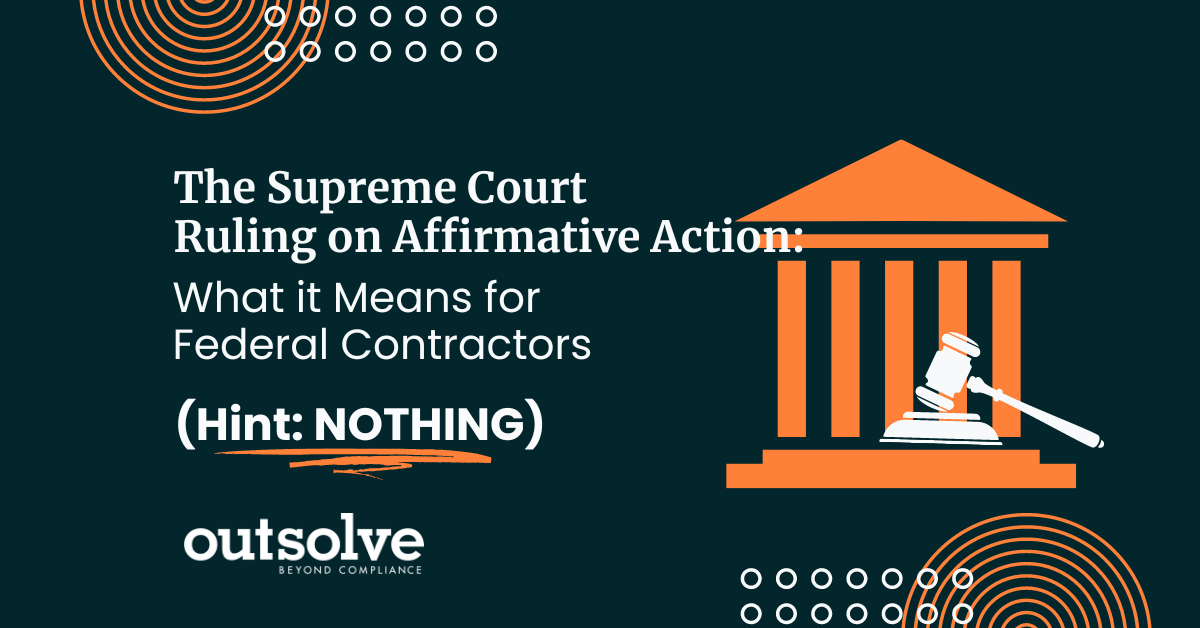3 min read
The Supreme Court Ruling on Affirmative Action: What it Means for Federal Contractors (Hint: NOTHING)
 Jeremy Mancheski
:
Jun 29, 2023 10:30:01 AM
Jeremy Mancheski
:
Jun 29, 2023 10:30:01 AM

The Supreme Court recently addressed the subject of Affirmative Action in higher education, creating a flurry of confusing headlines about the topic and the practical implications of the decision.
In an effort to help educate the federal contractor community, Jeremy Mancheski, OutSolve’s Founder and President, provided the following commentary to clarify what this action means for federal contractors versus educational institutions.
Don’t let the term “Affirmative Action” fool you. For federal contractors, nothing has changed. In fact, there’s not even a path toward change. Ignore the noise, and the shared vocabulary. Focus on the decision and its targets. To understand what the Supreme Court Ruling on Affirmative Action means for federal contractors, read on…
The Supreme Court’s headline-grabbing ruling is strictly striking down racial preferences in college admissions. Two cases brought to the court allege Harvard University and the University of North Carolina discriminated against Asian-American applicants. The Students for Fair Admissions (SFA) brought the suits, arguing Harvard's practice violates Title VI of the Civil Rights Act of 1964, and claims UNC violated the 14th Amendment's equal protection clause.
Neither of those affect the Department of Labor, its mission, or its enforcement strategy.
In actuality, the court’s opinion here is you shouldn’t favor one racial group over another. That is precisely the intent and position of the Department of Labor in federal contractor compliance.
Not only does the court’s decision to side with the SFA not impact contractors’ current Affirmative Action obligations, it actually aligns with the government’s current mandates. But, that message can be hard to decipher, due to redundant nomenclature and the swirling narratives of media unfamiliar with the industry.
It’s why, a big fear I have, is federal contractors are going to read the news and believe this development somehow reduces, changes, or eliminates their obligations, when in fact the Department of Labor is specifically ramping up their enforcement related to contractor compliance and Affirmative Action. The only relation these two fields share is the term Affirmative Action, which has been used in many different parlances over the years, and do not share practical ramifications.
The decision to disallow university administrators from admitting applicants based on race aligns directly with the government’s role to eliminate favorable treatment toward individuals because of their race. The crux of the argument against Harvard and UNC stemmed on the schools’ proclivity to use race as a qualification, in an attempt to diversify the student body. It resulted in unfavorable treatment toward Asian-American applicants.
And the court agreed. By doing so, the Supreme Court merely stood in lockstep with the Affirmative Action mandates the government has required of federal contractors for decades.
The OFCCP’s primary role is to ensure the decisions of hiring, promoting, and terminating employees are due to performance and qualifications, not on their background. This decree was given a stamp of approval by the highest court in the land.
So, although the news might say it’s a loss for Affirmative Action in higher education, it is just more of the same for federal contractors.
Because boosting and docking applicants due to race, as these two schools were accused of, runs in complete opposition to the government’s regulatory process in the employer side of the Department of Labor. It’s set up to remove any preference, in any direction. And that includes a much wider berth, including the protection of females, covered veterans and Individuals with Disabilities.
In fact, the mission was so clear, that in recent years they have pursued cases that negatively impacted white men, illustrating a steadfastness to equal treatment.
In this court decision, what’s being effectively outlawed, is the decades-old practice of giving preference to specific candidates because of race. So, it’s actually the exact opposite of federal contractor compliance in some respects.
So, is there any practical fallout from this decision for federal contractors? It’s hard to conceive of one.
First, the cases were insulated in the world of higher education admissions. And in a wider scope, the decision serves to reinforce that the nation’s powers-that-be are geared toward maintaining laws which eliminate workplace discrimination from all directions.
Having been in Affirmative Action for more than 30 years, I have seen Republican administrations and Democrat administrations and the policy adjustments that come along with them. And Affirmative Action for federal contractors outlaws discrimination based on any race, so this ruling sends the message current enforcement strategy is firmly entrenched and will continue to develop, regardless of its impact on university admissions.
Basically, read beyond the noise and see the signal. Nothing has changed.
Jeremy Mancheski is the President and founder of OutSolve. Having been involved in affirmative action plan (AAP) implementation and employment consulting for over 30 years, Jeremy has been responsible for the preparation and implementation for tens of thousands of AAPS, including supporting a wide range of clients—spanning from Fortune 100 companies to startups—through hundreds of compliance evaluations within every region of the country.
Weekly OutLook
Featured Posts

5 Key Compliance Items HR Can’t Afford to Ignore

HR Compliance Checklist: What Every HR Pro Needs to Know
Related Posts

What Texas HB 149 Means for HR Professionals
AI is already changing how companies hire, manage, and evaluate employees in the workplace. For HR professionals, AI is a game changer because it can...

New Jersey Pay Transparency Laws: What You Need to Know
Update: New Jersey proposed updates to its pay transparency law in October 2025. If passed, the requirements will be a first of its kind in that...

Legal Series: Top 4 HR Compliance Trends to Watch in 2026
This article is part of an ongoing legal series designed to provide insight and practical guidance on current and emerging workplace compliance...
